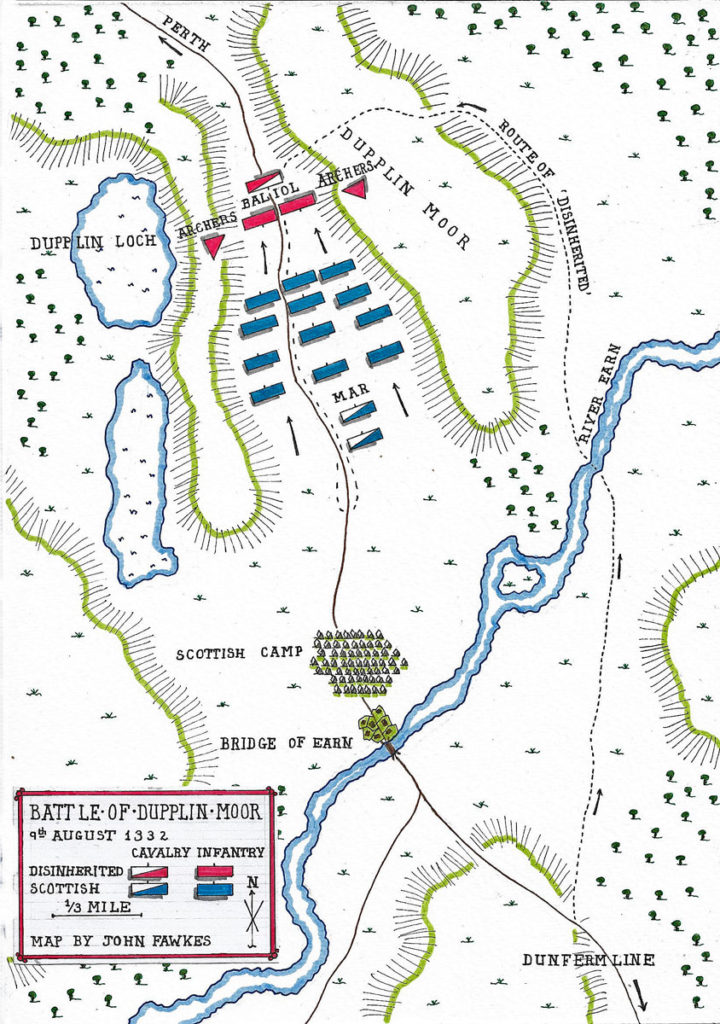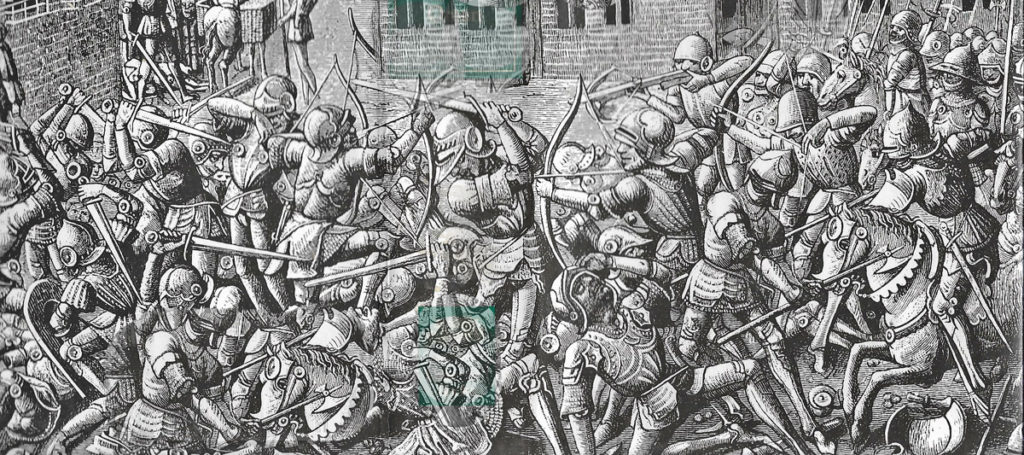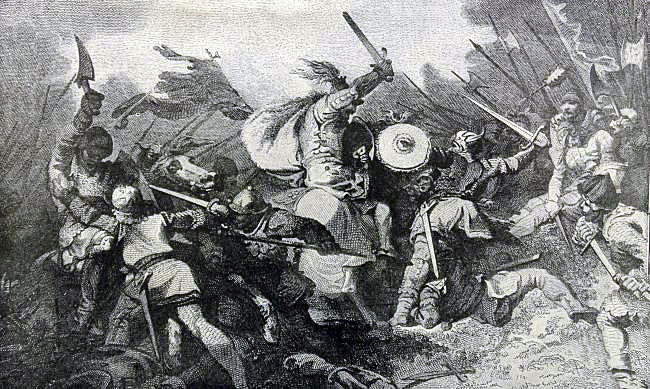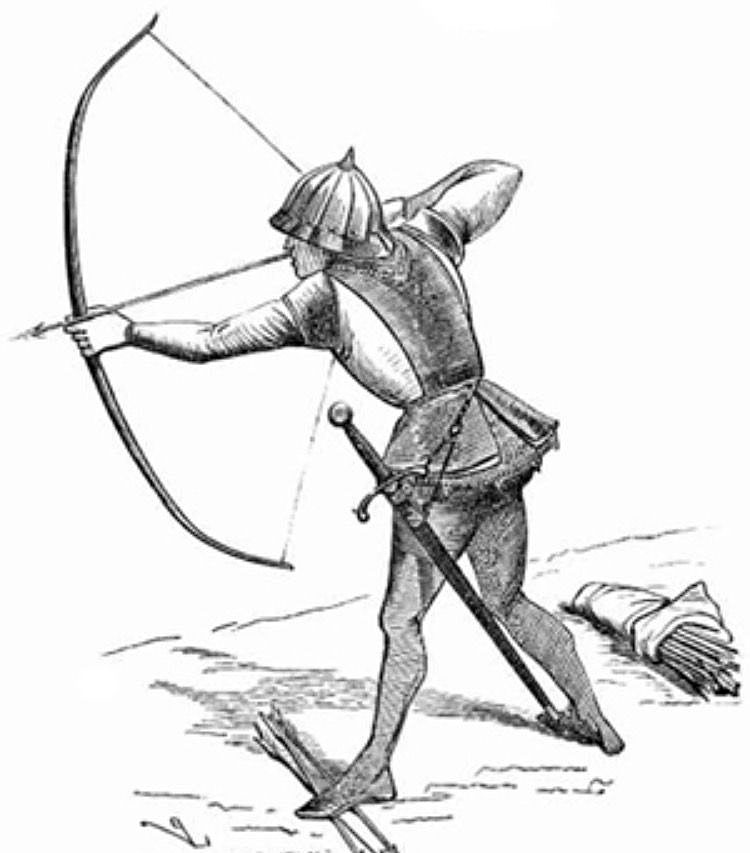The Battle on 9th August 1332 in the Scottish Wars of Independence in which the army of the ‘Disinherited’ overwhelmed a much larger Scottish army with the first use in battle of massed longbowmen
The previous battle of the Scottish Wars of Independence is the Battle of Bannockburn
The next battle of the Scottish Wars of Independence is the Battle of Halidon Hill
To the Scottish Wars of Independence
War: Scottish Wars of Independence.
Date of the Battle of Dupplin Moor: 9th August 1332
Place of the Battle of Dupplin Moor: South of Perth in Scotland.
Combatants at the Battle of Dupplin Moor: An essentially English army led by English noblemen and some Scottish noblemen, known as the ‘Disinherited’, with a small body of European mercenaries, against a much larger Scottish army.
Commanders at the Battle of Dupplin Moor: The army of the ‘Disinherited’ was commanded by Edward Balliol, claimant to the Scottish Throne, with Gilbert Umphraville, Earl of Angus, David, Earl of Athole, Henry de Beaumont and Walter Comyn.
The Scottish army was commanded by the Scottish Regent, Donald, Earl of Mar.
Size of the armies at the Battle of Dupplin Moor: The army of the ‘Disinherited’ numbered around 1,500 men. The Scottish army may have numbered 10,000 to 15,000 men or more.
Uniforms, arms and equipment at the Battle of Dupplin Moor:
The army of the ‘Disinherited’ comprised a core of around 500 fully armed and mounted knights and men at arms, with 1,000 archers armed with the English longbow.
The knights and men-at-arms fought on foot in armour, with spears, swords and shields.
The archers fought with the six-foot English longbow, firing a yard-long arrow over a range of 200 yards.
The Scottish army comprised a small corps of knights and men-at-arms, armed as the ‘Disinherited’, with a large contingent of foot soldiers armed with pikes and other weapons.
The Scottish army did not have a significant body of archers.
Winner of the Battle of Dupplin Moor: The Scottish army was largely annihilated, leaving the army of the ‘Disinherited’ the winners of the battle.
Events leading to the Battle of Dupplin Moor:
After a lifetime of warfare against Kind Edward II and the English, Robert the Bruce, King Robert I of Scotland, died on 7th June 1329.
King Edward II of England died on 21st September 1327.
After a final unsuccessful campaign against the Scots, the English entered into the ‘Shameful Peace’ of Northampton on 4th May 1328, negotiated on behalf of the young King Edward III by his self-appointed regents, Queen Isabella and Mortimer.
One of the significant consequences of Robert the Bruce’s successful campaigns against the English had been the dispossession of many of the English and Scottish nobles with estates in Scotland who fought for the King of England.
The Peace of Northampton purported to permit these nobles to return to their lost estates provided they did homage to the King of Scotland.
Attempts to implement these provisions were ignored by the Scots, largely because the estreated estates and titles had been passed to supporters of Bruce and were no longer available to be returned.
In 1332, a body of the most significant and powerful of the ‘Disinherited’ noblemen, both Scottish and English, gathered an army in England to invade Scotland and redeem their estates by force.
Humiliated by the terms of the ‘Shameful Peace’, the young King Edward III of England probably approved of the planned invasion of Scotland by the ‘Disinherited’, but being bound by the terms of the treaty was unable to give it his formal support. Edward ordered his officials to prevent the invading army from crossing the border into Scotland.
The ’Disinherited’ invaded Scotland by sea, collecting a fleet in the Humber Estuary and landing near Kinghorn in Fife before marching on to Dunfermline.
From Dunfermline, the ‘Disinherited’ marched north towards Perth.

The Scottish regent, Donald, Earl of Mar, lay behind the River Earn, to the south of Perth, with a large army assembled from across the centre of Scotland, comprising 2,000 men-at-arms and up to 15,000 foot soldiers.
Mar moved his army forward and took up position on the north side of the River Earn, blocking the bridge over the river.
Account of the Battle of Dupplin Moor:
It has to be asked why Mar did not cross the River Earn and attack the army of the ‘Disinherited’ with his substantial superiority in numbers.
Mar was a cautious man and perhaps feared treachery in his own ranks through sympathy with the plight of the ‘Disinherited’.
Once night had fallen, the army of the ‘Disinherited’ crossed the River Earn by a ford downstream of the Scottish camp, identified by one their number familiar with the area.
Once across the river the army of the ‘Disinherited’ launched a surprise attack on the rear of the Scottish camp.
There was a substantial slaughter of the Scottish foot soldiers encamped on the northern side of the Scottish camp.
When dawn came the main Scottish contingent could be seen advancing in good order on the army of the ‘Disinherited’, having been in the part of the camp nearest the river, away from the point of the surprise assault.
The Scottish army was headed by the banners of twelve earls and great barons.
In the face of the assault by an army of much greater strength than their own, the army of the ‘Disinherited’ withdrew up the valley, heading north, away from the Scottish camp.
At the head of a narrowing defile, the army of the ‘Disinherited’ halted and prepared for battle.
The English and Scottish knights and men-at-arms dismounted and formed a single formation, the small number of foreign mercenaries remaining mounted in their rear.
The archers formed two clumps, one on each flank of the main force of knights and men-at-arms.
The Scottish army was entirely dismounted, other than a small force of men-at-arms in the rear and advanced in one main column, flanked by two smaller columns.
As the Scottish army forced its way along the narrowing up-hill defile it became increasingly compressed.
The Scots reached the knights and men-at-arms of the ‘Disinherited’ and pressed forward, initially forcing them up the incline.
The ‘Disinherited’ pushed back and with the advantage of the slope brought the Scottish column to a halt.
The many thousands of Scottish infantry advancing from behind pushed forward and a terrible press of men built up at the head of the Scottish army, into which the flanking columns were fed by the angle of the hillsides.
As the struggle took place between the two forces, the archers of the army of the ‘Disinherited’ moved down the hillside on the flanks and fired volleys of arrows into the Scottish ranks.
For the first time an army was subjected in battle to volleys of arrows discharged by English archers.
The Scottish infantrymen on the flanks pushed towards the centre to escape the arrows, building more pressure in the compressed Scottish column.
Finally, the Scottish army broke, fleeing back down the valley, leaving hundreds of casualties on the field, most suffocated by the dreadful press of bodies.
They were pursued by Henry de Beaumont leading the mounted mercenaries of the army of the ‘Disinherited’ with those knights and men-at-arms who managed to retrieve their horses to join the pursuit.
The Scottish army was all but destroyed, only 14 knights being said to have escaped the battlefield.
Casualties at the Battle of Dupplin Moor:
Among the slain were the Regent, Donald Earl of Mar, the Earls of Menteith and Moray, Robert Bruce, Earl of Carrick, the king’s cousin, Alexander Fraser, the High Chamberlain, 18 bannerets, 58 knights, 800 squires, 1,200 men-at-arms and innumerable foot soldiers.
The army of the ‘Disinherited’ lost just 33 knights and men-at-arms, among them John Gordon and Reginald de la Beche.
No archers were lost.
Follow-up to the Battle of Dupplin Moor:
The tactics used at the Battle of Dupplin Moor became the standard battle tactics for the English in the next two centuries, leading to such victories as Creçy, Agincourt and several others.
Baliol, Beaumont, Umfraville and David of Athole all fought in the English army of King Edward III at the Battle of Halidon Hill, where archers were deployed in a similar manner against the Scottish, again to devastating effect.
References for the Battle of Dupplin Moor:
Trial by Battle, Volume I of the four volume record of the Hundred Years War by Jonathan Sumption.
The Art of War in the Middle Ages Volume Two by Sir Charles Oman.
The previous battle of the Scottish Wars of Independence is the Battle of Bannockburn
The next battle of the Scottish Wars of Independence is the Battle of Halidon Hill
To the Scottish Wars of Independence



